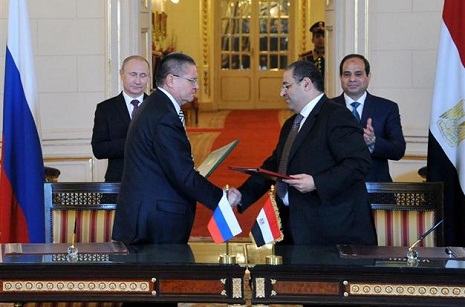Putin is a key non-Arab backer of Egyptian President Abdel Fattah al-Sisi, who has faced US criticism for his deadly crackdown on opponents since he ousted Islamist leader Mohamed Morsi in July 2013.
Putin`s first visit to Cairo in a decade follows a 2011 uprising that toppled ex-strongman Hosni Mubarak, whom the Russian leader met on his previous trip in 2005.
Experts say Putin`s visit was also aimed at showing that he is not isolated internationally despite the crisis in Ukraine.
On Tuesday, Putin and Sisi made a brief statement to reporters after Russian and Egyptian officials signed a memorandum of understanding to build a nuclear power plant in Dabaa on the Mediterranean coast -- Egypt`s first such facility.
Egypt had taken steps in the early 1980s to launch a nuclear plant to produce electricity in Dabaa but it was shut down after the Chernobyl disaster in 1986.
Putin and Sisi did not take any questions from reporters during their joint statement.
When the Russian leader arrived on Monday he held brief talks with Sisi and the two later attended a concert at the Opera House before dining in the capital`s landmark Cairo Tower.
Putin also gave a Kalashnikov assault rifle to Sisi as a gift.
Putin was received with a guard of honour and a 21-gun salute, while posters of the Russian leader were plastered on Cairo`s main roads greeting him in Russian, Arabic and English.
Russia hosted Sisi`s predecessor Morsi during his one-year presidency despite having banned the Islamist`s Muslim Brotherhood as a "terrorist group" in 2003.
But Moscow was also one of the first countries to endorse Sisi`s presidency last year.
Sisi visited Russia when he was defence minister soon after ousting Morsi -- amid deteriorating relations with Washington -- and he followed up with an August 2014 trip as president.
At their meeting last summer at Putin`s summer residence in Sochi, the two discussed Russia supplying weapons to Egypt, which is fighting an insurgency in the Sinai Peninsula that has killed scores of policemen and soldiers.
Moscow has sought to secure a larger slice of the Egyptian arms market after Washington suspended some weapons deliveries in the immediate aftermath of Sisi`s crackdown on Morsi supporters.
At the time, Russian media said the two sides were close to signing a $3 billion deal for Moscow to supply missiles and warplanes, including MiG-29 fighters and attack helicopters.
However Washington has since resumed its annual $1.5 billion in aid to Egypt, also delivering Apache helicopter gunships to fight jihadists in Sinai.
Egypt`s ties with the United States still remain cooler than before Morsi`s ouster, with Washington criticising Sisi`s regime for repressing Islamist as well as secular dissent.
Washington also regularly criticises the Egyptian judiciary for handing down lengthy prison sentences to Morsi supporters and secular activists, after often speedy trials.
"Putin continues to take advantage of ambiguity and contradictions in Western policies toward the Middle East," said Anna Borshchevskaya of The Washington Institute For Near East Policy.
As long as Washington criticises "Egypt`s democratic backslide... it keeps open the door for Putin... to gain influence in Egypt at the expense of US interests," said the expert on Russian policy in the Middle East.
More about:















































